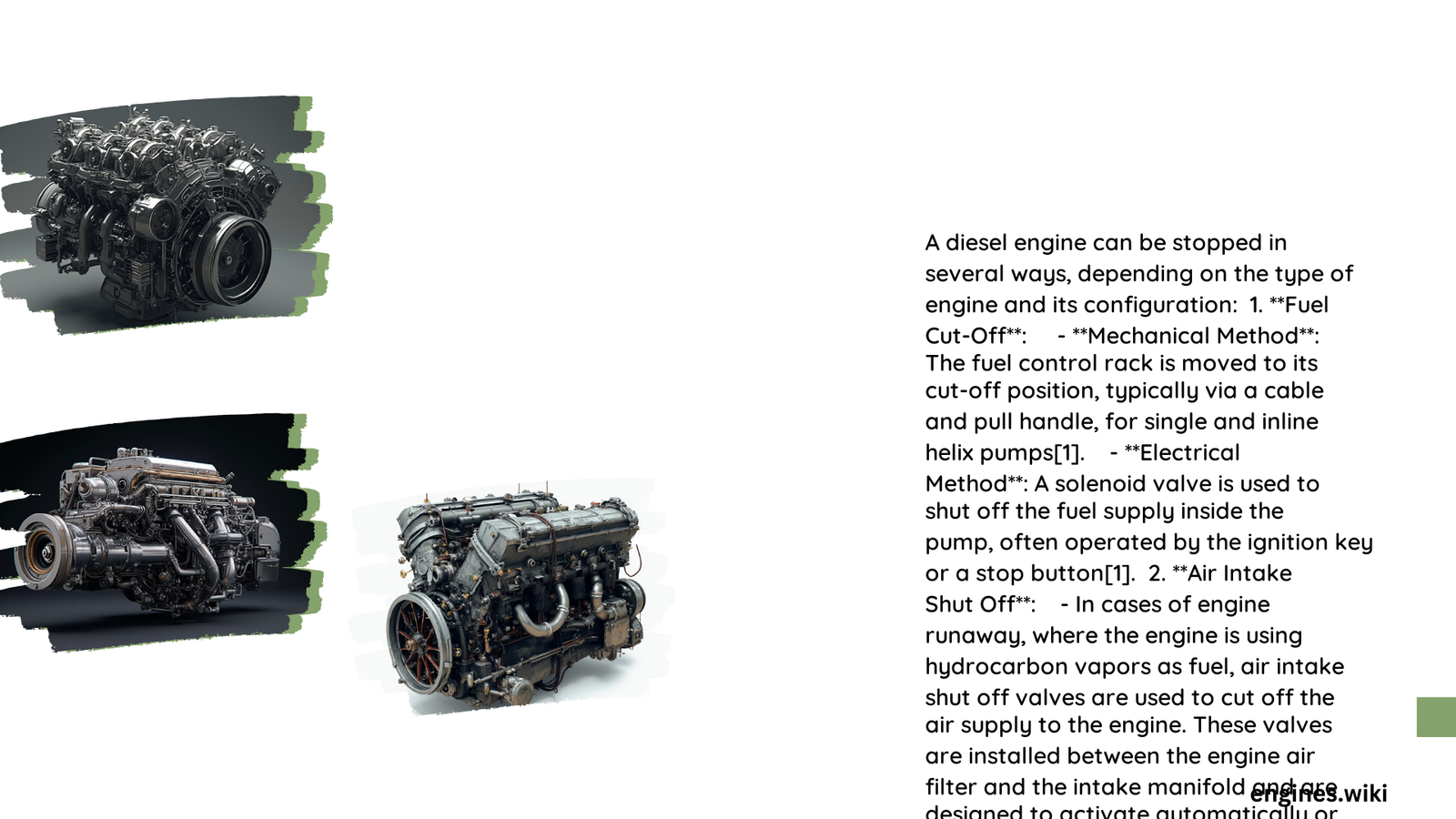Diesel engines are known for their durability and efficiency, but they can still encounter issues that cause them to stop running. Understanding what stops a diesel engine is crucial for proper maintenance and troubleshooting. This article explores the main factors that can halt a diesel engine, including fuel contamination, air intake blockages, injector failures, and low compression. We’ll delve into the specific thresholds, indicators, and repair methods for each of these problems.
What Are the Main Types of Fuel Contamination That Can Stop a Diesel Engine?
Fuel contamination is one of the primary culprits that can bring a diesel engine to a halt. There are several types of contamination to be aware of:
Water Contamination
Water in diesel fuel can cause significant problems for an engine. Here’s what you need to know:
- Diesel fuel can typically hold up to 200 ppm of dissolved water.
- Exceeding this threshold leads to free or emulsified water in the fuel.
- When water-holding capacity is surpassed, water can gather at the tank’s bottom.
- This creates an environment conducive to microbial growth.
Microbial Growth
Microbes thriving in diesel fuel can cause severe engine issues:
- Often facilitated by the presence of water.
- Produces acids that corrode the tank and degrade fuel quality.
- More common in ultra-low sulfur diesel (ULSD) due to lack of natural defenses.
- Indicated by slimy “mats” floating on the fuel and release of corrosive acids.
Particulate Contamination
Particles in diesel fuel can cause engine damage and poor performance:
- Sources include road dust, engine rust, and wear particles.
- Modern diesel fuel standards require ISO cleanliness levels of 13/9/6 or better.
- ISO 4406 code measures particles larger than 4µm, 6µm, and 14µm.
- Stricter standards demand fewer particles per ml of fuel.
How Can Air Intake Blockage Be Identified and Prevented?

Air intake blockage can significantly impact diesel engine performance. While there aren’t specific pressure differentials or airflow rates that directly indicate blockage, several symptoms can suggest air intake issues:
- Reduced engine power
- Increased fuel consumption
- Decreased engine efficiency
To prevent air intake blockages:
- Regularly check and clean air filters.
- Follow manufacturer’s guidelines for maintenance intervals.
- Typically, air filters should be checked every 15,000 to 30,000 miles.
- Adjust maintenance frequency based on operating conditions.
What Are Common Injector Failures and How Are They Diagnosed?
Injector failures can cause a diesel engine to stop running. Two common types of failures are:
Nozzle Wear
Symptoms of nozzle wear include:
- Decreased fuel efficiency
- Reduced engine power
- Increased emissions
Diagnosis methods:
– Fuel pressure testing
– Injector flow testing
Solenoid Malfunction
Indicators of solenoid malfunction:
- Erratic engine performance
- Misfires
- Decreased power
Diagnosis method:
– Electrical testing to check for proper solenoid operation
For both types of injector failures:
| Aspect | Details |
|---|---|
| Replacement Cost | $500 to $2,000+ per injector set |
| Time Required | Several hours to a full day |
| Best Practice | Replace entire injector set for even performance |
How Is Low Compression Identified and Repaired in Diesel Engines?
Low compression can cause a diesel engine to stop running. Here’s how to identify and address this issue:
Compression Values
- Normal range: 350-400 psi for most diesel engines
- Readings below 300 psi often indicate significant issues
Diagnostic Method
The primary tool for diagnosing low compression is a compression test using a compression gauge.
Common Causes and Repair Costs
- Worn piston rings
- Repair cost: $1,000 to $3,000
- Cylinder head problems
- Repair cost: $2,000 to $5,000
- Valve issues
- Repair cost: Varies based on extent of damage
For severe cases, engine rebuilding may be necessary:
– Cost: $5,000 to $10,000 or more
– Time required: Several days to several weeks
What Are the Key Takeaways for Preventing Diesel Engine Stoppage?
To keep your diesel engine running smoothly:
- Regularly check fuel quality and filter for contaminants.
- Maintain clean air intake systems and replace filters as recommended.
- Monitor engine performance for signs of injector issues.
- Conduct regular compression tests, especially if experiencing power loss.
- Address any issues promptly to prevent more severe damage.
By understanding what stops a diesel engine and implementing proper maintenance practices, you can significantly extend the life and reliability of your diesel engine.
References:
1. US: Fuels: Diesel and Gasoline | Transport Policy
2. Diesel Fuel Contaminants – Bell Performance
3. Diesel Fuel Standards and Rulemakings | US EPA
